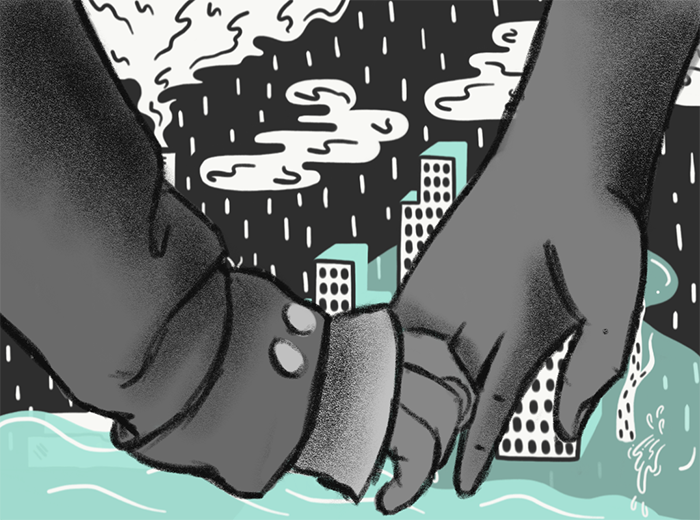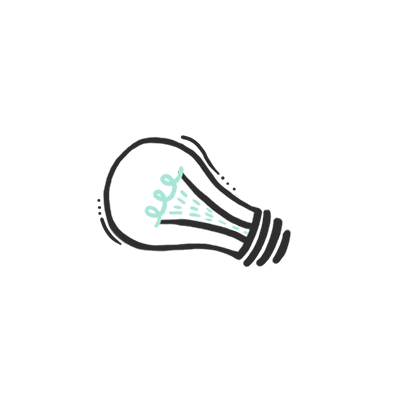You can find part one in Caroline’s two-part climate change series right here.

So, you’re worried about climate change! It is an almost unimaginably large problem that will affect different people and communities in different ways. It’s also likely you have your own personal problems and goals happening at the same time. Below are some resources I’ve turned to over the past few years to help process these changes.

Approaches
Intention
The foundation for each and every step of this work is checking in and getting clear on what your intention is. Make a practice of asking yourself why you’re doing this work. “Because I’m scared” is an ok answer! Try to see what is beneath the fear, and articulate a vision of what kind of person you’d like to be as the climate changes.
Honoring Emotions, Including Grief
Do you feel rage some days about having been born into this problem? Do you feel like sticking your fingers in your ears and blocking it all out another? Make space for all of it. Honor it, and let it teach you about where to put your attention and how to relate to other people.
Acknowledging that life is temporary – Facing our mortality is one of the most difficult and near-incomprehensible things we can do. As someone with anxiety, I have always been preoccupied with my own demise and worried about how it might arrive. But through practice, I’ve been able to see that as a motivation to be gentle with myself and others.
Negativity Bias
The human brain has evolved to detect threats. I like to remember this when I find myself starting to notice only the negative news, or when my mind starts projecting worst case scenarios about the future. I try to accept that there are things that will happen that I could never have expected. Keeping this in mind is really useful for me when despair shows up.

Wisdom
These are some books and documentaries that have informed my perspective and that provide me with some foundation in doing work to address climate change.
This Changes Everything – Naomi Klein
The book and the related documentary both do a lot to spell out how we got ourselves into this problem, the efforts invested in making sure we aren’t aware of how extensive it is, and the movement already happening across the globe to stop the burning of fossil fuels.
Hope in the Dark and A Paradise Built in Hell – Rebecca Solnit
Both of these books have done a lot to inform the way I view response to disasters and related feelings of despair. Solnit looks the the forgotten history of social movements and the unexpected altruism in times of struggle without putting on rose-colored glasses.
Active Hope – Joanna Macy
Joanna Macy first caught my attention as a guest on the On Being podcast, in her episode titled A Wild Love for the World. She is not one to mince words. “Things are bleak,” she says. “So what?” Her whole body of work, including her Work that Reconnects workshops which I highly recommend, is about facing up to our grief and doing the work anyway.
How to Let Go of the World – Josh Fox
This documentary takes you through Fox’s own emotional process of facing up to climate change. It’s at times joyful, sad, and frustrating, but ultimately hopeful.

Tools
Each of these practices can be put into practice on an individual level, and can also be used to build relationships.
Permaculture
While you might not have the resources to put the agricultural side of permaculture into practice, the general model is a great way to think about how we approach our lives and other people.
Nonviolent Communication
‘Nonviolent is a loaded term, but don’t let it deter you from checking out this communication process. The way we use language can escalate or de-escalate a situation, and NVC is full of practices for transforming tense situations into solutions.
Meditation
Sitting for a few minutes each day to let your mind settle can be a great way to get grounded amidst a world of uncertainty. No particular background or belief is needed, everyone can jump in and check in with their subjective experience.
Direct Action
Direct action takes many forms and has been involved in many social movements through history. Generally speaking it involves acting directly on a problem. One example is people chaining themselves to pipeline equipment to stop the flow of fossil fuels. I am not recommending that everyone put their safety and legal status on the line, but it can be a useful tactic to know about.
Getting Grounded
When I feel anxiety begin to rise, I sometimes feel like I don’t know what to do with my hands. For me, practicing scales on the guitar becomes a way to get grounded in the physical world. Some people I know like rock climbing or knitting for the same reason. By engaging with an object, we allow our awareness to come out of the fantasy world of projected future catastrophes and into the present moment, where things tend to feel a bit more manageable.

Communities, Models, and Approaches
People have been working on approaches to climate change for awhile now. Here is some of that work.
Transition Town Movement
The transition town movement is an incredibly thorough model of making communities more resilient in the face of climate change. See if there’s a hub near you!
Contemplative Care
As the conditions around us change, becoming oriented towards caregiving will be an important aspect of this transition. More and more people will need your help.
Transformational Resilience
According to this model, climate change will not only inflame old trauma but will create new trauma. We will need to understand how our own trauma functions not just for our own well-being but so we can be in a position to help deescalate and provide care.
Standing Rock and Idle No More
What happened and continues to happen at Standing Rock and in indigenous communities across the globe as the fossil fuel industry doubles down on extraction has a lot to teach the environmental movement about resistance to extractive industry.
Environmental Justice
Intersectionality means the movement for justice against oppression is meeting the environmental and climate movements, and organizations like Uprose are doing amazing work in making sure people see that vulnerable communities have already been dealing with this issue.
This paints a general outline of approaches and practices I’ve found really useful since I first found out about our changing global climate. How this change impacts each of you will be different, so err on the side of being gentle with yourself, getting help and support when you need it. Don’t hold yourself to an impossible standard of willing the anxiety away. Human beings have never faced a problem like this and even for experts, experiencing this is uncharted territory. We will need each other in the coming months. This will be a huge challenge but I believe wholeheartedly that those of us who feel called to do so can help each other get through it.
You can find part one in Caroline’s two-part climate change series right here.








Comments
I’ll be honest, and this may be my ecosocialist tendencies talking, I’ve always been a bit underwhelmed by the Transition Towns movement- while I like the idea of re-thinking how our communities function to be more sustainable, I often find that they don’t seem to go far enough. We’ll need to do more than just plant some community gardens and put up some solar panels to adapt to a changing planet.
(Plus- and this is one of my criticisms of permaculture, as well- there’s often more than a bit of back-to-the-land mysticism that creeps in, which isn’t always the most helpful thing in the world. If we’re going to go the route of localized production, why the focus on herbalism and homeopathy and not on, say, figuring out how to grow penicillin in our basements?)
(I will also admit both of these views were colored by my interaction with them circa 2011-2013, and the respective movements may have evolved since then.)
With all that said, another group you might interested in and that’s doing some really fascinating work is Open Source Ecology (opensourceecology.org).
Please always let the ecosocialist tendencies shine through, we need them! Thank you for sharing about Open Source Ecology, I hadn’t heard of it and it looks awesome. And, I think that’s a totally valid critique of both the Transition Town movement and permaculture. I will admit that i’ve never interacted with a formal Transition Town group, just a) people inspired by the model and b) groups that do different kinds of local autonomy/resilience work and organizing. One is Woodbine (http://woodbine.nyc) in NYC– I’m not sure if they were directly influenced by the Transition Town movement but they certainly put some of that template to work AND take it a step further with an explicit critique of capitalism.
I have studied permaculture and I totally agree that the idea that forming groups and putting creating permaculture gardens is simply not enough. But, the thing I think is important about permaculture is that it CAN catalyze a systems-thinking mentality that I know I didn’t grow up with and I think is not really emphasized in mainstream education/media. So, permaculture as a perspective and a design tool becomes one skill in a toolkit of approaches towards cultivating this sort of systems-thinking and really letting it sink into the bones. Of course, if you already have an ecological approach to things, you might not need this practice. Anyway, thanks for commenting, can’t wait to check out Open Source Ecology!
If you’re interested in groups that are applying the lessons of the last hundred year or so of direct action campaigns to climate change, I highly recommend checking out the work EQAT and POWER are doing in Philadelphia.
EQAT successfully forced PNC Bank to divest from mountaintop removal mining in 2015. The current POWER/EQAT campaign focuses on getting their regional power utility to source a significant portion of its electricity from rooftop solar in neighborhoods with greatest need.
The idea is that “with local solar, workers can earn good wages and communities can produce and sell their own power.”
I really, really like EQAT–I’m a donor there myself, even though I live way on the other side of the country.
this looks really awesome, thank you so much for sharing!
I am a science teacher, in FL. According to our guidelines, I am supposed to teach about the “effects” of climate change, but not teach about the “causes.” Happily, I’m of the opinion that they can just come on into my classroom and directly confront me if they are that worried about it :)
I spend a lot of time talking with kids about rising ocean temps and acidity, rising CO2 in the atmosphere, coral reef dying out, and the Paris Climate Accord. I tell them about the problems, and then we talk about short term solutions and long term solutions. We talk about personal responsibility toward our home planet. We talk about kids that have become activists and inventors.
I am just one middle school teacher- but I’ve been doing this about 12 years now. I’d like to think that in some small way I am changing the future a little bit. For the better. Thank you for your contribution and your article!
Wow! This is a LOT and I’m going to have to take some time to read through and unpack both articles as my emotional energy allows, but I wanted to thank you for this work! And welcome to AS!
Thank you! Long-time reader, first time poster, stoked to get to share this stuff with such a thoughtful community.
Okay so I might have made an account just to post this but! If you struggle with dissociative symptoms like depersonalizations or derealization, PLEASE be super careful meditating b/c it makes it very easy for you to dissociate without realizing it. Obviously not all experiences are universal, but myself and several friends of mine have learned this the hard way. So if you feel like this comment might apply to you, maybe have a friend sit with you and check in every few minutes so that you stay present ❤
This is a really great point and I should have emphasized this more in the post. Full disclosure: I’m a meditation teacher and I myself struggled with the practice because it surfaced some CPTSD that I didn’t even know I was grappling with. I was lucky enough to study with some teachers who rrreeaaalllyyyy emphasized being gentle with yourself in practice. I completely echo the sentiment of practicing with another person if that’s accessible to you, even via Skype. Also, don’t feel like you have to do 20 minutes. For some people, including me when I first started practicing, “being in my body” for more than 1 minute at a time was incredibly difficult, so I didn’t push myself and let myself ease into it over time, using soothing music as an object of focus sometimes, or ambient sounds in the room. Definitely err on the side of being gentle with yourself!
Thanks again for this comment, this is a really important thing to bring up with regards to mindfulness/meditation/yoga practices.
Glad that y’all are covering this.
Yes! Thank you for this. Also check out Little Village Environmental Justice Organization http://www.lvejo.org & Climate Justice Alliance http://www.ourpowercampaign.org
I also want to thank you for covering this.
Experience has taught me how crucial it is to select a high-quality solar panel. Many people don’t even know where to acquire them, but you can view and read them in detail here . Since solar panels are the way to go, I hope this will be as helpful to you as possible. I’m fortunate to have them, and now that I do, I can rest easy knowing that, in the worst case scenario, I’ll always have a reliable source of energy.